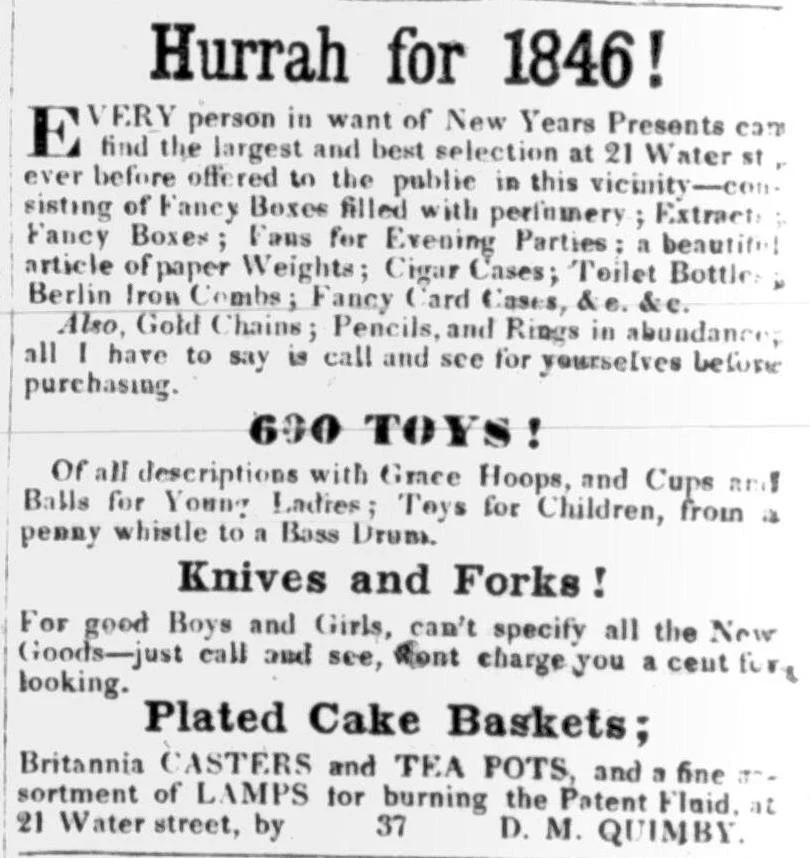by Barbara Rimkunas
This "Historically Speaking" column was published in the Exeter News-Letter on Friday, Dec. 22, 2023.
The problem of Christmas troubled Exeter’s townsfolk in the early 1800s. The Puritan roots of New England steadfastly objected to the papist celebration of what they considered a false holiday. The actual date of the birth of Christ isn’t revealed biblically, and Christmas celebrations in the old country were seen as riotous drunken bacchanalias. Yet, there still seemed to be need of marking the close of the year. What to do? Celebrate Christmas or perhaps make note of the New Year?
We can trace local thought on the issue by reading the early editions of the Exeter News-Letter. The paper has been printed continuously since 1831, so the editorial comments reflect the mood of the town. Christmas, in the early editions, is ignored. On the impending New Year, the editor in 1832 commented, “What a fine theme for moralizing is this! What a teeming subject for a newspaper paragraph! What a glorious opportunity is presented to enlarge on bitter disappointments, blasted expectations, the uncertainty of life, the rapid march of time, golden hopes, airy visions, and the like. But like the squinting Captain, whose story is told on our last page, although we could say something, yet – we won’t.”
The following year, in 1833, he again commented on his refusal to discuss the New Year. “We did intend to commence our editorial remarks of this week with a somewhat lengthy and truly sentimental article on the new year. It is a glorious theme, and one or more columns of original matter might be spun from it, but with little trouble. But we finally concluded not to inflict any such punishment on our subscribers.”
But something seems to have been afoot in the town. Perhaps the editor began picking up on small celebrations in the town. He reprinted a New Year message from another paper that reflected a tone that might be more acceptable. “A Happy New Year, is a New Year that finds us with our sins forgiven, with the spirit of Christ reigning in our hearts, and with preparation for whatever duties, or changes, or events, the year may bring us.” So, best wishes for the year, but don’t celebrate too much.
Merchants being merchants, the lack of gift giving around here always bothered the bottom line. As early as 1836, a local bookseller hinted that perhaps it wouldn’t be out of line to purchase a subscription to a juvenile magazine. “Here I come again my young friends to wish you a happy New Year, and to bring you my Magazine for 1836, much improved in appearance, and enlarged in size.” Perley’s Magazine included, “pleasant stories, handsome pictures, humorous anecdotes, moral advice, narratives, voyages and travels, songs now and then to enliven you, and romantic tales to enchant you.” It wasn’t quite the Sears Wishbook, but the advertisement did speak to children and parents about the joy of providing a gift for seasonal reasons.
The News-Letter finally yielded to the New Year (but not Christmas) in 1844. “We tender to our readers and friends the compliments of the New Year and heartily wish them a Happy New Year.” Four years later, A.W. Lovering advertised holiday shopping at his store – “We have been collecting articles suitable for Christmas, New Year, and Birth-Day GIFTS for the past six months!” In this way, he was able to encourage Christmas shopping, while providing a theological off-ramp for anyone objecting to its celebration. Nope. I didn’t buy a Christmas gift – it’s a New Years gift.
This continued to be the pattern into the 1850s. “Christmas and New Year are approaching, and all who design to celebrate those holidays in an appropriate manner, are invited to call upon the undersigned and examine his stock of splendid…books and fancy goods.” But just to be sure the paper itself wasn’t encouraging this, the January 10th, 1853, edition ran a three-paragraph commentary on the seriousness of New Years. “To every reflecting mind, the New Year is a season of sadness; we look upon the past twelve months and find many good resolutions broken, and many follies committed, and we almost tremble as we ask ourselves, what report the year has borne to heaven? The New Year is before us; we are just crossing its threshold, and we enter with trembling footsteps. It is given into our hands, a fresh white tablet, to write thereon whatsoever we please, and we may tremble for fear of marring it.” Happy New Year to you, too.
Rest assured; New Englanders did eventually learn to accept a bit of old-world festivity. Even in that same sad 1853, there was a bit of cheerful news. The New Hampshire legislature met on January 1st – an ordinary workday. “Mr. Chamberlain of Keene rose and said, ‘Mr. Speaker, I am delegated by the members of this House to wish you a happy new year.’ Hon. G.W. Kittredge, the Speaker, replied ‘Mr. Chamberlain and gentlemen: I return you my best thanks for your kind wish; and I hope many happy returns of the season may be enjoyed by you all.’” And then, without another word about it, they went about the business of the day.
New Hampshire made Christmas an official state holiday beginning in 1861. It took longer for people in Exeter to finally allow themselves to enjoy the season.
Image: the January 10, 1846 edition of the Exeter News-Letter had this advertisement for New Years’ gifts – Christmas was not celebrated in town until the New Hampshire declared it a state holiday in 1861.
Barbara Rimkunas is curator of the Exeter Historical Society. Support the Exeter Historical Society by becoming a member! Join online at: www.exeterhistory.org.
